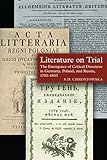Literature on Trial : The Emergence of Critical Discourse in Germany, Poland & Russia, 1700-1800 / S. D. Chrostowska.
Material type: TextPublisher: Toronto : University of Toronto Press, [2012]Copyright date: ©2012Description: 1 online resource (288 p.)Content type:
TextPublisher: Toronto : University of Toronto Press, [2012]Copyright date: ©2012Description: 1 online resource (288 p.)Content type: - 9781442643567
- 9781442696365
- Criticism -- Germany -- History -- 18th century
- Criticism -- Poland -- History -- 18th century
- Criticism -- Russia -- History -- 18th century
- German literature -- History and criticism -- Theory, etc
- Polish literature -- History and criticism -- Theory, etc
- Russian literature -- History and criticism -- Theory, etc
- LITERARY CRITICISM / General
- 801/.95094309033 23
- PT78 .C476 2012
- online - DeGruyter
| Item type | Current library | Call number | URL | Status | Notes | Barcode | |
|---|---|---|---|---|---|---|---|
 eBook
eBook
|
Biblioteca "Angelicum" Pont. Univ. S.Tommaso d'Aquino Nuvola online | online - DeGruyter (Browse shelf(Opens below)) | Online access | Not for loan (Accesso limitato) | Accesso per gli utenti autorizzati / Access for authorized users | (dgr)9781442696365 |
Browsing Biblioteca "Angelicum" Pont. Univ. S.Tommaso d'Aquino shelves, Shelving location: Nuvola online Close shelf browser (Hides shelf browser)

|

|

|

|

|

|

|
||
| online - DeGruyter Stages of Reality : Theatricality in Cinema / | online - DeGruyter The Agon of Interpretations : Towards a Critical Intercultural Hermeneutics / | online - DeGruyter The Culture of the Seven Years' War : Empire, Identity, and the Arts in the Eighteenth-Century Atlantic World / | online - DeGruyter Literature on Trial : The Emergence of Critical Discourse in Germany, Poland & Russia, 1700-1800 / | online - DeGruyter Law's Religion : Religious Difference and the Claims of Constitutionalism / | online - DeGruyter Colonial Virtue : The Mobility of Temperance in Renaissance England / | online - DeGruyter The Retail Value Proposition : Crafting Unique Experiences at Compelling Prices / |
restricted access online access with authorization star
http://purl.org/coar/access_right/c_16ec
Literature on Trial traces the rise of modern literary criticism in Central and Eastern Europe during the eighteenth century. S.D. Chrostowska juxtaposes the discourse's written forms in three linguistic-cultural regions - Germany, Poland, and Russia - to show how fluid the relationship once was between the genres of criticism and those of literature.An alternative history of literary criticism, Literature on Trial marks a shift from earlier studies' focus on aesthetic principles to an emphasis on the development of literary-critical forms. Chrostowska relates cultural and institutional changes in these areas to the formation of literary-critical knowledge. She accounts for the ways in which critical discourse organized itself formally and deemed some genres 'proper' while eliminating others. Analysing works by Lessing, Goethe, and Karamzin, among others, Literature on Trial brings a fresh theoretical perspective to the links between genre as a discursive strategy and socio-political life.
Mode of access: Internet via World Wide Web.
In English.
Description based on online resource; title from PDF title page (publisher's Web site, viewed 01. Nov 2023)


